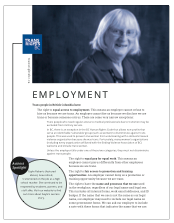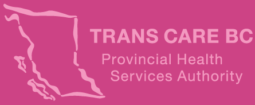Update: For information regarding the addition of Gender Identity and Expression to the 2016 BC Human Rights Code, and to the 2017 Canadian Human Rights Act, please visit the Explicit Protection page.

Trans people in British Columbia have:
- Trans people who need regular access to medical professionals due to transition may be excluded from military service.
- The right to equal access to employment. This means an employer cannot refuse to hire us because we are trans. An employer cannot fire us because we disclose we are trans or because someone outs us. There are some very narrow exceptions:
- In BC, there is an exception in the BC Human Rights Code that allows non-profits that serve an identifiable, ‘vulnerable’ group (such as women) to discriminate against trans people. This was used to prevent one woman from volunteering with a domestic/sexual violence organization because she was trans (Nixon v. Vancouver Rape Relief Society, 2005 BCCA 601). Fortunately, many women’s organizations (including every organization affiliated with the Ending Violence Association of BC) welcome and include trans women.
- Unless the employer falls under one of these two categories, they must not discriminate against trans people.
- The right to equal pay for equal work. This means an employer cannot pay us differently from other employees because we are trans.
- The right to fair access to promotion and training opportunities. An employer cannot deny us a promotion or training opportunity because we are trans.
- The right to have our chosen name and pronouns used in the workplace, regardless of our legal name and legal sex. This includes all internal forms, work email addresses, and ID badges. If our chosen name is not the same as our legal name, our employer may need to include our legal name on some government forms. We can ask our employer to include a note with these forms that indicates our chosen name.
- The right to change your gender identity and presentation on the job. This will likely go much smoother if we talk to our supervisor or human resource person first. This applies even if we do not plan on having surgery.
- It’s not fair, but you may have to educate your employer about what it means to be trans. It might help you feel less nervous if you plan out what you want to say ahead of time. You might want to give your employer some pamphlets, links to websites, books, or other information to help them understand. Many employers are open to accommodating trans employees, but are unsure of how to help and nervous about doing the wrong thing.
- Work with your supervisor or human resource manager to come up with a plan for transition that works for you and your employer. There is no one way that someone should transition at work. It all depends on what you are comfortable with. Some people choose to transition slowly, while others take a few days off and present in their affirmed gender as soon as they get back.
- The right to access a washroom or change room that is appropriate for your gender.
- The right to wear a uniform that corresponds to your gender identity.
- The right to be protected by the employer from bullying and harassment we might face related to your gender identity or expression.
- The right to keep our trans status confidential, if we so choose. If our employer is aware that we are trans, they must keep that information confidential.
- The right to take time off work for medically necessary treatments, including gender-affirming surgeries. We do not need to tell our employer what kind of surgery we are having. Our employer has the right to know and ask:
- When we expect to be off.
- How long we will be off.
- Whether the procedure might affect our ability to do our job, and if so, how.
- Whether we will need any special accommodation on our return to work.
Our employer can ask for a note from our doctor confirming any of these things. We can lessen the risk that we will have problems in the workplace by:
- Providing our employer with a doctor’s note confirming our need for time off and the dates we are expected to be off.
- Giving our employer as much notice as possible that we will need time off.
- Working with our supervisor and co-workers to make sure our work can be covered while we are off.
- Staying in touch with our employer while we are off, even just to check in and see how things are going.
- Giving our employer regular updates if our return to work date changes.
What laws protect us?
- Trans people are protected from discrimination under the BC Human Rights Code on the basis of ‘sex.’ People are working to have ‘gender identity’ included in the BC Human Rights Code for the purposes of educating the public about our rights. However, we have these rights even without ‘gender identity’ explicitly mentioned in the Code.
- Trans people are also protected from crimes under the Criminal Code.
How can you stand up for your rights?
- Record what happened.
- Be sure to include the five W’s for each incident: what happened, where it happened, when it happened, who was involved, and why it happened.
- Include as much detail as possible. For example, a note that says, “John discriminated against me” will not be much help. Compare this with a note that says, “On Friday, December 4, I was in the coffee room at approximately 3 p.m. when my supervisor John Smith came in. He raised his voice and told me that I was not ‘a real woman’ and that I had no business pretending to be one.”
- If you feel safe doing so, talk with the person who is causing the problem. For information about advocating for yourself in an assertive way, see our Self-Advocacy Guide for Trans People.
- If a person continues to mistreat you after you have spoken with them, you can bring it up with your supervisor or human resource manager. If the person mistreating you is your supervisor, you can bring it up with their boss. Your employer has legal obligations under human rights and workers’ compensation law to make sure you are not bullied or harassed in the workplace.
- If that still doesn’t stop the behaviour, you can make a formal complaint to someone outside your work. You have two options:
- Complain to WorkSafeBC . WorkSafeBC will send someone to investigate the complaint and attempt to resolve it. The next step would be to file a formal complaint. A WorkSafeBC mediator will try to help both sides reach a settlement. If that is unsuccessful, they will appoint an officer to review the situation and decide how the problem should be fixed. This decision can be appealed.
- Complain to the BC Human Rights Tribunal .
Who can you go to for help?
- For a free legal assessment of your situation, contact The Catherine White Holman Wellness Centre . Email lawyer@cwhwc.com to book an appointment. CWHWC has a legal clinic for trans and gender diverse people twice a month. There is a waitlist. Clinic lawyers are not able to represent you, but they can give you a list of lawyers who specialize in human rights complaints. If you cannot travel to the Catherine White Holman Wellness Centre, you may be able to set up an appointment by Skype. Another organization called Access Pro Bono has over 75 legal advice clinics throughout the province. Not all Access Pro Bono lawyers will be familiar with trans legal issues. For more information about Access Pro Bono and the programs it offers, or to find a legal advice clinic in your area, go to: accessprobono.ca or call: 1-877-762-6664.
- To find a lawyer, call the BC Branch of the Canadian Bar Association at 604-687-3221 or 1-800-663-1919 (Monday to Friday, 8:30am to 4:30pm). They can give you the name of a lawyer who does Human Rights Complaints and Charter cases, and who will have a consultation with you for up to 30 minutes for a fee of $25 plus tax.
- To find the contact information for a lawyer whose name you already know, you can use the Lawyer Lookup tool.
- For help filing a human rights complaint, contact the BC Human Rights Tribunal . They may also be able to represent you. However, there are rules about what cases the Tribunal takes on. Contact them at 604-775-2000 in the Lower Mainland or 1-888-440-8844 in the rest of BC.
Resources
- Workers in Transition: A Practical Guide about Gender Transition for Union Representatives. By the Canadian Labour Congress.
- TransForming Employment Law by barbara findlay QC and Elizabeth Reid 2013.
- The Human Rights Complaint Process for Transgender People in BC by barbara findlay, QC. To download it for free, human_rights_process_for_trans_people_in_bc_nov_17_2014 (5)




